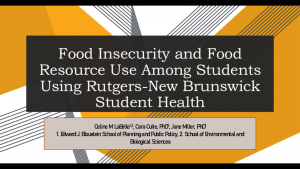LaBelle, Celine: Food Insecurity and Food Resource Use Among Students Using Rutgers-New Brunswick Student Health

View Video Presentation
Title: Food Insecurity and Food Resource Use Among Students Using Rutgers-New Brunswick Student Health
Name: Celine LaBelle
Major: Public Health
School affiliation: School of Environmental and Biological Sciences
Programs: George H. Cook Scholars Program; Bloustein Honors Research Program
Other contributors: Cara Cuite, Jane Miller
Abstract:
Oral Defense – https://rutgers.mediaspace.kaltura.com/media/BHRP+Oral+Defense+-+LaBelle+-+Sp+20/1_sz25q1od
Background: The USDA defines food insecurity as an “economic and social condition of limited or uncertain access to adequate food” (United States Department of Agriculture, 2019). Food insecurity can often adversely impact physical, mental, and social health. My main objective was to analyze the relationship between student food insecurity and the use of on-campus food resources. Subsequent analysis explored the relationships between sociodemographic characteristics, student characteristics, and use of food resources.
Methods: During the fall 2018 and spring 2019 semesters, food insecurity was measured using a two-item screener built into the Personal Health History Questionnaire (PHH) offered through Rutgers Student Health (RSH). Sociodemographic characteristics, general student characteristics, and use of on-campus resource data were provided by the Office of the Registrar, Rutgers Student Affairs, and the Rutgers Student Food Pantry. Bivariate statistics (crosstabs) and multivariate statistics (logistic regression) were used to predict and compare varying use of on-campus food resources by varying races, genders, citizenship statuses, and food insecurity statuses.
Results: While 9.7% of participants were food insecure, only 6.1% used any food resource. Consistent with my predictions, food insecure students were almost eight times as likely to use on-campus food resources in comparison to their food secure peers. Students of color and students with permanent citizenship statuses were also more likely to use on-campus food resources.
Implications for further research: There is a demonstrated need to understand food resource use in student populations. Students most at-risk should be encouraged to seek and receive help at available food resources. Future research could consider programs to accomplish this.